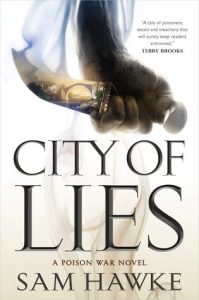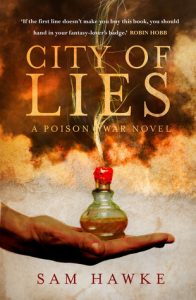City of Lies by Sam Hawke
 A word that keeps coming up when I see people talking about City of Lies (and plenty of people are) is “refreshing”. It’s one I’m going to use several times as well, because this book was a breath of fresh air, and a thoroughly enjoyable read. That’s not to say it wasn’t also challenging, thrilling, brave, and heartbreaking as well. Nor is it perfect, but so few books are, let alone a debut novel in what promises to be a must-read series.
A word that keeps coming up when I see people talking about City of Lies (and plenty of people are) is “refreshing”. It’s one I’m going to use several times as well, because this book was a breath of fresh air, and a thoroughly enjoyable read. That’s not to say it wasn’t also challenging, thrilling, brave, and heartbreaking as well. Nor is it perfect, but so few books are, let alone a debut novel in what promises to be a must-read series.
In contrast to another good book I read recently, this one will stick longer in my memory not because it’s better written, but because I admire everything it tries (largely successfully) to do. The mystery is subtle and well-done from the beginning to the end, with minor details coming back to have major significance. It also manages a rare feat in fantasy in showing the horror and heroism of war without glorifying violence or warriors. Perhaps most of all, the characters are refreshing in many ways, fallible and flawed yet brave and good.
City of Lies is a book about awakenings, about opening of eyes. The (often brutal) death of naivete, the end of innocence. The written book follows that narrative in a way, with some of the early scenes seeming a bit naive, or somewhat simplistic, only to mature as you read on – just as our narrator-protagonists do. Makes you wonder if it was done on purpose.
Of course, naive protagonists are hardly uncommon in fantasy, but instead of gauche yet precocious youths realising their hidden power, here we have the coddled offspring of a rich, intellectual, peaceful society learning that their world isn’t what it seems. Being just as used to world-weary, damaged, cynical protagonists (especially but not exclusively in the current grimdark trend), it can be difficult to believe anyone could be so naive – and yet, most of us would be in the face of a sudden uprising in our peaceful, rule-of-law society.
It’s great to see non-warriors showing that heroism can be more than just martial, even in a war. Apart from the two protagonists – one of whom is the poison-detecting “proofer” and the other of whom is a diplomat-spy so secret even her brother doesn’t really know – we have engineers, athletes, scribes, and actors taking up the mantle of defending their city, and way of life. In a further twist, both of our narrators have disabilities, one suffering from debilitating compulsions, the other from a condition that has left her physically weak and vulnerable. I’m not an expert on disability, but I think it’s especially notable that neither is conveniently “cured” or even compensated with some magical gift – they just get on with it.
Now, I mentioned that it wasn’t perfect, so I’ll say that, while the dual first-person narration worked very well for the purposes of the story, a little more differentiation in voice would have been helpful. The distinction was there, but subtle, more in what they focused on or how they reacted than in their tone or style. There was also a degree of vagueness with Kalina, who keeps secrets from the reader about her illness and her training, though I suppose it’s understandable in a personal narrative where you wouldn’t need to elaborate on such things.
 The book might also be criticised for some of its choices, but I consider the brave choices its biggest strength. It’s wonderful to see a utopia rather than a “crapsack world”, even if it’s not all it promised to be. Of course there is still treachery and plotting, but – refreshingly – this is the unthinkable exception rather than the rule. Even more admirable is that the characters stick to their principles in the face of mounting odds and the collapse of their world. In a fantasy landscape where anti-heroes almost as bad as the villains are usually the only ones with the necessary mettle to save the world, it’s nice to see that you don’t have to join ‘em to beat ‘em. The social constructions of Silasta – matrilineal inheritance; emphasis on honour, civility, and education; atheism and disbelief in magic – are also refreshing, naturally enhancing the story in vital ways.
The book might also be criticised for some of its choices, but I consider the brave choices its biggest strength. It’s wonderful to see a utopia rather than a “crapsack world”, even if it’s not all it promised to be. Of course there is still treachery and plotting, but – refreshingly – this is the unthinkable exception rather than the rule. Even more admirable is that the characters stick to their principles in the face of mounting odds and the collapse of their world. In a fantasy landscape where anti-heroes almost as bad as the villains are usually the only ones with the necessary mettle to save the world, it’s nice to see that you don’t have to join ‘em to beat ‘em. The social constructions of Silasta – matrilineal inheritance; emphasis on honour, civility, and education; atheism and disbelief in magic – are also refreshing, naturally enhancing the story in vital ways.
And it might just be me, but I thought I detected a definite antipodean flavour to the book as well. This was not just about some of the names, but perhaps in the freedom to write a land where nothing is quite the same as the old world (and after all, shouldn’t more fantasy do this?). Also, there’s the apparent deadliness of the environment, and maybe even the old, Earth-linked religion of the native people. Australia (and New Zealand) certainly has a rich fantasy tradition, and this is a worthy addition to that canon.
Overall, City of Lies is one of the standout debuts – and books – of the year, and stands alone while opening the door for sequels already in the works – and which I’ll definitely be reading!

[…] review of City of Lies is here, but in short the books stood out and won my heart because of the choices it made. The book took […]